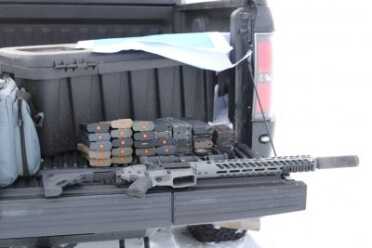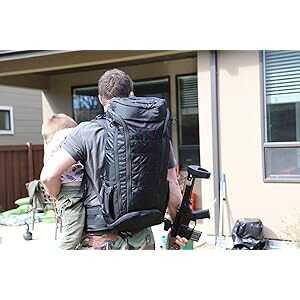This week, we are exploring the V-Drill. The V-Drill as far as I know was invented by Jerry Miculek, who can teach a thing or two about shooting. I’d say he has certainly earned his place on the Mt. Rushmore of competitive shooters. Jerry first showed off the V-Drill around seven years ago, and it has been subsequently run with everything from ARs to Barrett M82s.

The setup, using Action Target’s new AWD PRO paper targets.
Before we talk about the positives and negatives of the drill, let’s discuss how to run it. The basic set up is five silhouette targets, and as the name implies, set in a “V” shape.
The center target is at 10 yards. On the left, just off the center shoulder, are two more targets. One at 11 and another at 12 yards. On the right side of the center target, it’s the same setup. On the “go” signal, the shooter engages each target in the following sequence:
- Center target: two shots
- Right 11-yard target: two shots
- Center target: two shots
- Left 11-yard target: two shots
- Center target: two shots
- Right 12-yard target: two shots
- Center target: two shots
- Left 12-yard target: two shots
- Center target: two shots
Starting left or right is irrelevant. For an added bonus you can alternate the way you start, as long as you stay to the sequence of tagging back to the center target. The drill requires 18 rounds as shown, which is a fair bit of precious 5.56.
Penalty times for shots outside the A/0 zone vary by shooter. Feel free to make up your own depending on your needs. For instance, a hostage rescue unit might make the penalty for a non-perfect shot a complete failure of the drill. A 3-Gun shooter preparing for a “two anywhere” style match might not assess any penalties so long as the lead lands on paper.
I haven’t seen a hard and fast scoring system laid down yet. But regardless, you should feel free to modify any drill to your needs anyway.

SIG Virtus and NightForce 1-8 in action on the V-Drill.
Why Shoot the V-Drill?
So, why would you want to run this drill? It does have some good points. For anyone interested in close quarters battle (CQB) range skills, there is a lot to be said for the rifle control needed to finish this drill. Controlling your rifle across short arcs, rapidly, is a very handy skill to have. Not only for combat but for competition and hunting as well. I like that the drill goes both left and right, forcing you to do both.
Many CQB range drills that we run are unidirectional, and as we try to squeeze every fraction of a second out to improve our time, we develop a habit of preferring one way. Most right-handers, myself included, shoot left to right unless we have a compelling reason not to. And this drill does make rifle training work at relatively short ranges. Not everyone has the wide open spaces like I do out West, so it is a great drill to run if you are stuck in a 25-yard bay.
Now for the negatives. Let me state up front, this is not a drill I think you need to run all the time. Nor should you spend an inordinate amount of ammunition trying to master it. Why? Glad you asked.
First off, for the tactically minded, I am not a big fan of any drill that requires you to shoot a thinking sequence. To get an 18-round drill like this to an instinctive level would require a huge investment of time and ammo. That is not necessary since it is a sequence completely outside the realm of what one might encounter in the real world. Unless you are in the zombie apocalypse, in which case you need to be doing head-shots anyway. The only other plausible scenario for this much close range left and right shooting would be a horde of armed SJW attackers that have somehow decided to fill ranks like falling Spartans in a phalanx. That is to say, not very likely.
To be fair, I would offer the same criticism of Kyle Lamb’s famous 1-5 Drill. He says its purpose is to teach shooters to think while shooting. I disagree completely with that premise. Any thinking needs to be done before the shooting starts, and it consists of only one question. Am I going to give everyone some love and then mop up, or am I in a position to burn these to the ground one at a time in order? Anything that requires you to think about a pattern while you are supposed to be shooting to me is counterproductive. The same goes for number- and colored-shape drills.
Don’t Think, Shoot!
Why am I so harsh on thinking drills? Shouldn’t you be thinking while you are shooting, doesn’t that show some kind of increased cognitive ability? I say thinking is important, but it is not something you can replicate on the range.
Real combat is always a surprise, with the possible exception of when you are looking for a specific person to take down. In fact, if every competition consisted of only blind stages, I’d argue soldiers would always win. Because we have lots more experience dealing with changing “stages” on the fly. When I was overseas, it got to the point where I would ignore the intel assessment of what was behind a breach point, so as to not taint my awareness of what is as opposed to what should be. My point here is, trying to think about a set pattern as you shoot has not proven to me to be a combat necessary skill.

The V-Drill is really easy to set up.
How about for the competitive guy or gal? Well, there is merit for you. But again, mastery of the drill at an instinctive level is not what you need. You will never see this drill verbatim in a competitive venture for several reasons, among which 10 rounds on the center target would be a nightmare to score.
That said, one thing about running this drill cold, it does help prepare you for complex stage designs. Sometimes, in shooting sport, the stages are set up in such a way as to make perfect mental rehearsal impossible. The next best thing, while not ideal, is often to just remember a sequence. I go left twice, then right, hard corner shoot, reload- whatever. Running the V-Drill cold is a pretty good judge of your ability to translate thought into action.
Lastly, of course, this drill is fun. Scaled down to one round per target, it makes a great .22 carbine or pistol drill. It is not the end all be all, ninja-operator drill of the decade, but it is a blast. And it does have some training value. If you have five target stands, I recommend you try it this weekend. Just don’t overdo it.
Oh, and did anyone catch that in the video, I forgot to finish on the center target. Both times. Kudos to those who were paying close attention.

V-Drill gets em hot. Suppressor cooling you won’t find in any manual.
To learn more about the prouducts featured in this article, visit:
Hex Mag
Action Target
SIG Sauer
Nightforce



The thing was really quiet. Were you running a sub sonic load?
I seen other installments besides this mistake and I think this guy is an idiot destined to be on the Darwin awards.
Former Aeronautical engineer and current gunsmith here. I don’t know how hot you got that can, or if you actually “cooled” it with snow, but it’s very possible you’ve adversely affected its heat treat.
Call me paranoid but I sure like the peace of mind brought by seeing all my practice rounds hitting a berm.
Hello, Clay
I too liked your rendition of the V-15 drill but my main point to make is to voice my opinion of “Last Son of the War God” which I have just completed.
Bravo, Sir. Bravo!
May not have been your intention, but I found a couple parts of the book funny (“dirt worshipers”….)
I thought it was a wonderful and fresh writing style, and I devoured it during every available waking moment once I started it.
I began to get some insight into your “embrace violence” sign.
Awaiting the next one, Sir.
I felt bad about the match grade, but it is an ongoing test for SIG. And part of the testing is that I have to get the gun hot on some occasions, easier on burner drills than long range. I could have swapped out to another ammo, but if the gun failed, I would be outside the parameters of what we set out to do.
Clay you forgot to shoot finish the drill on the center target, so you only did 16 rounds. Somebody had to say it LOL.
Uhhh. BOTH times…
I like your videos Clay! Straight and to the point. Why did you use match grade ammo for this? Save the match for your distance shoots.
James, you forget those back two targets are at 12 yards not 10.
Happy New Year Clay. Like your video’s because you are not a pretentious operator type who thinks that he knows all and viewer knows nothing. Below Zero (-0 F ) in metro Detroit area ( the only Detroit ) so stay warm Clay.
Warrior Brilliance! Patterned drill work has not been effective combat training since the Red Coats stopped fighting in ranks, on line. Great article!
Interesting perspective on drills. It seems the whole industry is built on BS drills.